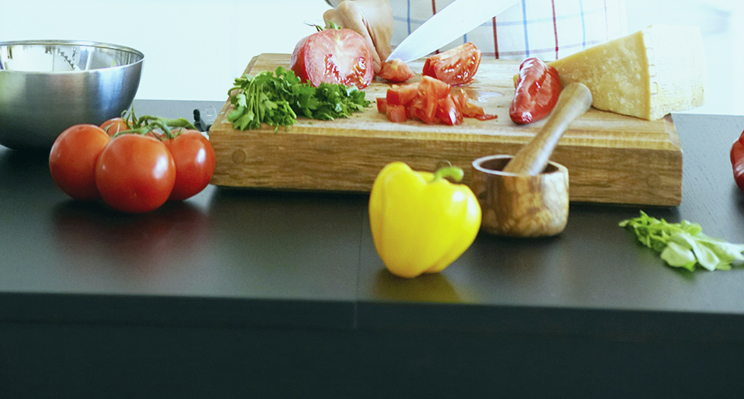Oversized portions mean Brits pile on the pounds
Brits are unaware of what constitutes a standard portion size and because of this men are consuming a staggering 778 calories1a extra per day, which could add up to one and a half pounds1b of excess weight a week. Women aren’t far behind, eating and drinking an extra 546 calories1a per day, leading to a possible weight gain of just over a pound1b a week, new research from Loveyourgut.com reveals.
The study has been carried out to coincide with Gut Week (22-28 August), a national campaign which aims to raise awareness of good gut health. Shockingly, the survey reveals almost half (44%) of us are oblivious to how many calories we should be consuming per day, whilst almost a fifth (18%) admit to not knowing the correct portion size we should be serving ourselves. Subsequently, as a nation, we’re eating more than a third2 over the recommended servings of foods such as rice, pasta and potatoes.
Dr Christian Jessen, medic and supporter of Gut Week 2011 says, “It’s very easy and tempting to eat too much food, but regularly consuming large portions can significantly increase your risk of excess weight gain, digestive problems, type 2 diabetes and coronary heart disease. I think many people will be shocked to learn that big portions can not only affect their waistlines, but can also cause internal health problems that may not be so clear. Dropping just a few calories per day, combined with regular exercise will significantly help over time.”
Food mannerisms
The research also reveals we’re not only in the dark about portion sizes; we’re also a nation unashamed to pile food onto our plates. A staggering three quarters (77%) eat more food at home than when out, a greedy fifth (23%) of us admit to having larger amounts of food if we are serving ourselves and one in ten (12%) have more than one helping for their evening meal. A worrying quarter (25%) also regularly eat their evening meal in front of the TV, where distraction leads to them being unaware of the amount they’re consuming. But, we don’t seem to just overindulge ourselves – when it comes to hosting friends or family we’re more likely to overcompensate, with over a fifth (21%) of us often providing more food for our guests than we feel necessary to prevent the worry of not having enough.
Hibernating habits
As we head into autumn, it appears the increasingly colder weather can have a negative impact on our food choices and lifestyles. The research reveals:
- Almost a third (30%) of us eat larger portions and two thirds (66%) increase our intake of carbohydrates such as bread, pasta and potatoes
- Over two fifths (45%) eat more processed and high calorie foods, such as ready meals, crisps and chocolate
- One third (33%) admit to exercising less
- 31% of us choose to sleep longer and 23%, to socialise more at home
- And 15% of us treat ourselves to more takeaways, rather than cooking at home
The research goes on to show a lack of awareness amongst the nation when it comes to high energy dense foods. A third (33%) of us admit we are unsure of what is meant by the term; 39% believe high energy dense foods are carbohydrates and over a fifth (22%) think they’re foods with energy boosting properties. This confusion is leading to unhealthy eating habits as almost a quarter (24%) of Brits are eating more high energy dense foods during the colder weather.
“Contrary to popular belief, high energy dense foods are those which have a high amount of calories in a small amount of food, such as chocolate and cheese”, says Dr Christian Jessen. “When the weather gets colder, people are tempted to tuck into larger portions of these foods, often in front of the TV, so not only are we eating more, but we’re also exercising less. This common practice of eating in front of the TV can be a big problem as you often eat a lot of food without noticing it, because you’re concentrating on your favourite programme! Watching what you eat doesn’t mean you have to give up everything you like – start with a few swaps and some simple changes and you’ll easily maintain a healthy weight.”
1) Use smaller plates – it will make even a normal size meal seem like a lot
2) Eat together – if possible, eat with family or friends. This gives visual clues as to how much others are eating and will help to monitor your own intake
3) Leave debris around you – foods such as chicken wings or drumsticks are a visual reminder of how much you have eaten. There is a reason that restaurants clear plates and food away quickly – it makes you eat more!
4) Try to keep your meals balanced – a third of your plate should be vegetables, a third starchy foods and the final third, a combination of protein like meat or fish, high energy foods and dairy foods such as milk and cheese
5) Avoid buffets at all costs – we simply cannot cope with the temptations and variety on offer and even ‘a little bit of everything’ will add up to a large amount
Organised by the Gut Week partners – digestive health charities Core and the IBS Network (formerly The Gut Trust) and in association with Yakult – www.loveyourgut.com offers practical advice and information on how to maintain gut health and seek help and support.
Notes to Editors
Research sample provided by One Poll in June 2011, with 2,000 respondents, aged 18+ years old


